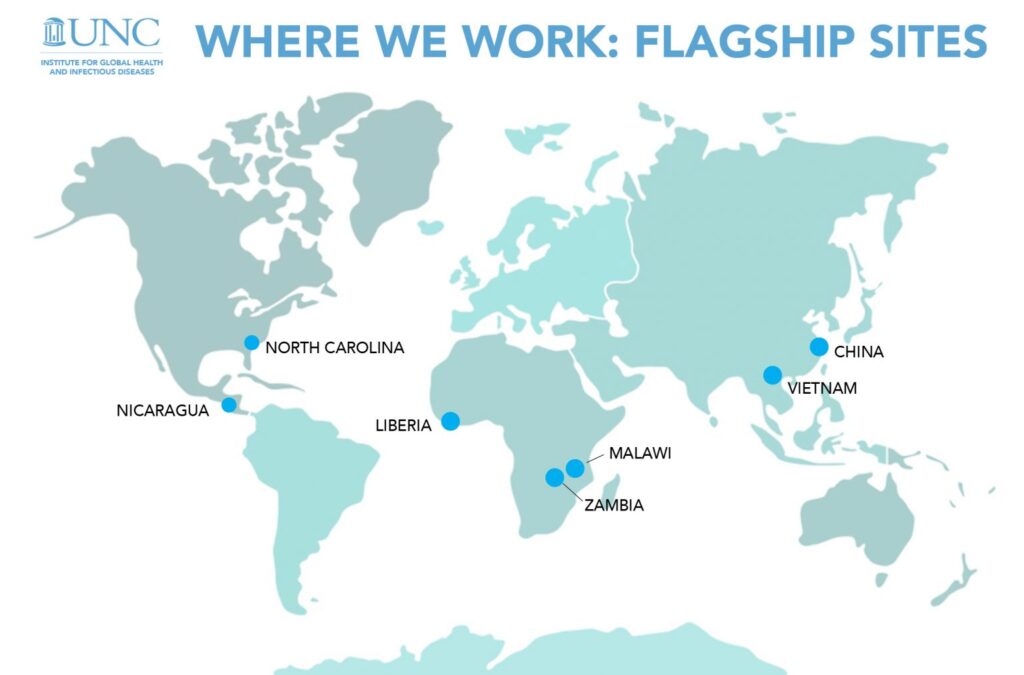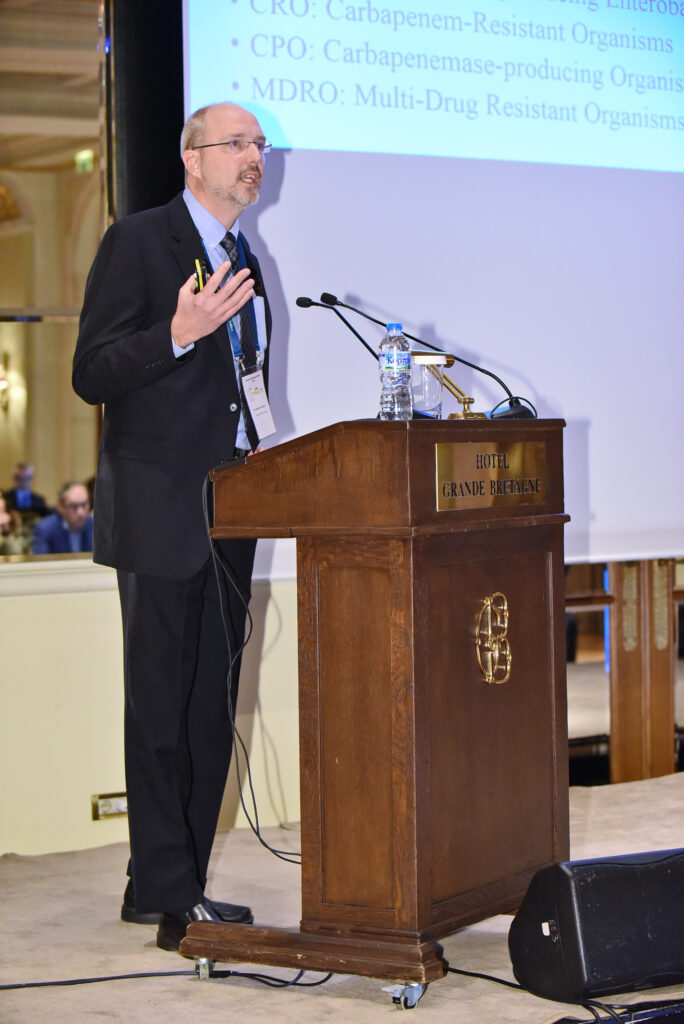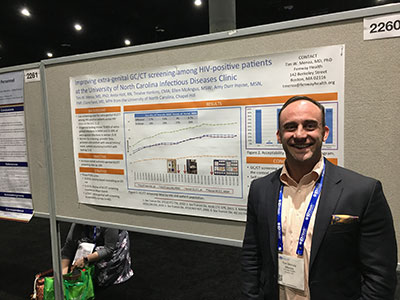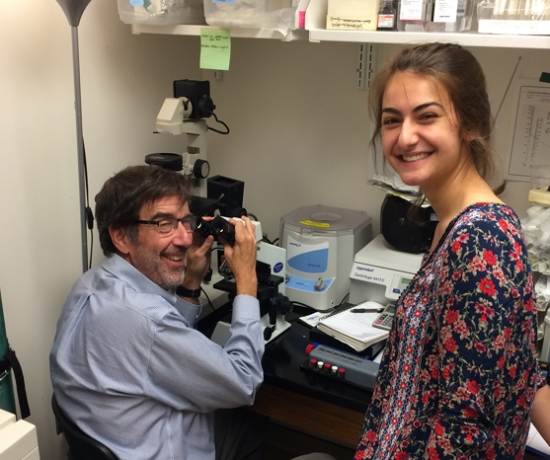Research Topic Areas
Active Research Sites

Ongoing Research Topic Areas
Click the arrow below to learn more about each research topic area.

The Antimicrobial Stewardship Program (ASP) of University of North Carolina Hospitals is charged with optimizing the use of antimicrobial agents at the institution. ASP was developed in July 2016 as a joint program of the Department of Pharmacy and the Divisions of Adult and Pediatric Infectious Diseases. The primary goals and objectives of the program are:
- Optimize patient outcomes by promoting the appropriate use of antimicrobials, including the choice of drug, dosing regimen, monitoring and duration.
- Reduce the risk of healthcare-associated infections due to multidrug resistant organisms.
- Assist the Adult and Pediatric Infectious Diseases Divisions and Department of Pharmacy in providing a coordinated approach to antimicrobial formulary and restriction management.
- Assist clinicians in antimicrobial decisions by integrating clinical pathways and decision support systems.
- Assist the Adult and Pediatric Infectious Diseases Divisions and Department of Pharmacy in promoting evidence-based medicine as it relates to prescribing, preparing, administering and monitoring antimicrobials.
- Perform medication use evaluations related to antimicrobial usage to identify areas for future intervention.
- Provide education to medical, nursing, and pharmacy staff related to antibiotic stewardship.
- Assist in the management of antimicrobial and vaccine shortages.
- Assure compliance with policy standards related to antibiotic stewardship.
Antimicrobial resistance is a substantial public health threat in the United States. The inappropriate use of antimicrobials by physicians is part of the reason for the current resistance problem. Implementation of stewardship programs should prevent or slow the emergence of resistance among microorganisms. This should result in reductions of patient length of stay, adverse drug reactions, morbidity, mortality and healthcare costs.
UNC Project-Malawi STI Clinic – UNC-Project Malawi is home to the country’s only two board certified infectious diseases specialists. The Sexually Transmitted Infections Clinic not only provides testing and care for more than 7,000 patients each year, but it is also the site of research into genital ulcer etiology, acute HIV detection, cervical cancer screening, anti-microbial resistance and recruitment of at risk subjects for a variety of UNC-led HIV research. Since 2006, this clinic has maintained a robust clinical database that is invaluable for analyzing trends and is used as a source of data for a variety of UNC trainees.
 ID Fellow Alumni Dr. Tim Menza presents his poster about self-swabbing to diagnose STD infections among patients in the UNC Infectious Diseases Clinic during ID Week.
ID Fellow Alumni Dr. Tim Menza presents his poster about self-swabbing to diagnose STD infections among patients in the UNC Infectious Diseases Clinic during ID Week.
UNC Project-China – The goal of the Immunology and Biology of Infectious Syphilis (IBIS) research project is to better understand the immunological basis for serological responses to syphilis. Approximately 20 percent of syphilis-treated individuals lack a serological response to therapy, calling into question one of the cornerstones of conventional clinical management. The IBIS team has made great progress during the past year, including successfully obtaining NIH supplemental funding for syphilis research training in Guangzhou. Vice-Director of the Guangdong Provincial STD Control Center, Dr. Heping Zheng, spent several months learning about B-cell immunology and cell sorting technology in the Duke laboratory of D43 training faculty, Dr. Anthony Moody. Assistant Director of the Guangdong Provincial STD Control Center Laboratory, Dr. Yaohua Xue, learned about cutting-edge molecular techniques for detection of Treponema pallidum, the bacteria that causes syphilis infection, in the laboratory of D43 training faculty, Dr. Justin Radolf.
UNC is also home to Center for AIDS Research (CFAR), directed by Ron Swanstrom, PhD. The Institute of Global Health & Infectious Diseases is home to the Collaboratory of AIDS Researchers for Eradication (CARE). CARE is a consortium of leading scientific experts in the field of HIV latency from several U.S. and European academic research institutions as well as Merck Research Laboratories working together to find a cure for HIV. UNC’s David Margolis, MD, leads CARE, which is headquartered in Chapel Hill. Since 2011 CARE research results have been published in more than 100 scientific journals. In February 2015, CARE collaborated with several other HIV organizations to release CUREiculum, digestible explanations of cure research designed for the layperson. Dr. Margolis and his team have also recently secured funding for the first study of a combination approach to purge and clear latent infection measuring the effects of Vorinostat in people living with HIV on antiretroviral therapy who have received an autologous DC cellular vaccine to boost HIV-specific immune response. Also on the HIV cure front, Angela Kashuba, PharmD, and collaborators including Victor Garcia-Martinez, PhD, received $4.4 million in R01 funding to help develop treatments that target HIV reservoirs. In order to develop and select treatments that will suppress the virus in all tissues and to help inform the work being done to cure HIV, Kashuba and her laboratory will identify which drugs penetrate tissues best and what mechanisms they use to do so. Myron Cohen, MD, serves as the co-Principal Investigator (PI) of the NIH HIV Prevention Trials Network (HPTN). The HPTN has 22 research sites around the world. Dr. Cohen serves as PI of the HPTN 052 study, and is a Protocol Chair of HPTN 081/HPTN 074 designed to determine if the VRC01 monoclonal antibody can prevent HIV acquisition.
Joseph Eron, MD, along with co-principal investigators Jeff Stringer, MD, and Mina Hosseinipour, MD, MPH, led the successful funding of the NIH HIV Network Clinical Trials Unit with sites in Chapel Hill and Greensboro, North Carolina; Lilongwe, Malawi; and Lusaka, Zambia, contributing to trials sponsored by HIV prevention, treatment and vaccine research networks.
Interest in research into parasitic tropical infections has been growing at UNC. Current research programs include basic parasite biology, translational research, particularly in molecular epidemiology and drug resistance, and clinical trials. The most concentrated focus is malaria research. The Infectious Disease Epidemiology and Ecology Lab (IDEEL) focuses on the study of malaria and other diseases with the goal of improving the health of the world’s poorest populations by improving our understanding of the infectious diseases that impact them most.

Jonathan Juliano, MD, continues to study the evolutionary and ecological factors that drive the emergence of drug resistance and the diversification of candidate malaria vaccine antigens. Dr. Juliano’s group has pioneered the use of state of the art sequencing techniques to push this field forward. Leading a multi-institutional study that included the University of Massachusetts and Karolinska Institute, his group recently published the first large scale survey of resistance associated genes in Africa in the Journal of Infectious Diseases. Finally, Carla Cerami, PhD, is researching the role of iron in the host pathogen interaction during malaria infection. This project, funded by both the Gates Foundation and the National Institute of Child Health and Development, is conducted primarily in The Gambia in collaboration with the Medical Research Council Unit in Gambia (MRC-Gambia), the International Nutrition Group at the London School of Hygiene and Tropical Medicine and the Liverpool School of Tropical Medicine. Finally our UNC-Project Malawi site was one of only 10 sites worldwide conducting a phase III trial of the first malaria vaccine.